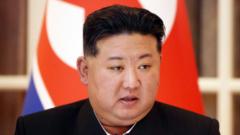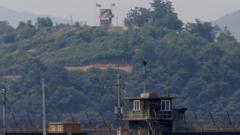In response to a political crisis triggered by former President Yoon Suk Yeol's martial law order, South Korea's lawmakers have amended legislation to strengthen parliamentary autonomy, barring military interventions.
South Korea Tightens Martial Law Regulations Following Political Turmoil

South Korea Tightens Martial Law Regulations Following Political Turmoil
Legislative changes enacted to prevent military obstructing parliamentary actions after former President's controversial martial law declaration.
South Korea's National Assembly recently passed amendments to its martial law regulations, preventing any actions that might obstruct lawmakers from accessing the assembly. This legislative update is a direct fallout from a significant political crisis that emerged after former President Yoon Suk Yeol's hasty imposition of martial law last December.
During Yoon's brief declaration of martial law, military units were stationed outside the National Assembly, necessitating lawmakers to climb over barriers to oppose the order. The amendments approved on Thursday now officially prohibit military and police forces from entering the National Assembly unless granted permission by its speaker.
Yoon, who declared martial law on December 3, 2024, confronted mounting political pressures due to parliamentary stalemate and corruption allegations. He justified his controversial move by claiming it was essential to shield the nation from supposed "anti-state" elements aligned with North Korea, though he provided scant evidence for his assertions.
The fallout from this political upheaval saw several high-ranking officials linked to Yoon's administration ousted and facing detention. Ultimately, Yoon was impeached and is currently undergoing a trial for insurrection, significantly weakening his ruling People Power Party.
The political landscape of South Korea took a turn in June, when opposition candidate Lee Jae Myung won a snap election to the presidency. In a recent press conference, Lee expressed intentions to improve relations with North Korea, marking a striking contrast to his predecessor's hardline approach.
Despite these changes, South Korean politics remain polarized, illustrated by the boycott of the parliament vote approving Lee's prime ministerial nominee by Yoon's party, now positioned as the primary opposition.















